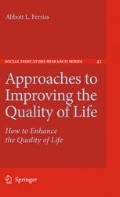Abstract
Affective Autonomy. Having pleasure, enjoying an exciting life, emotional well-being. These good things come to us during our leisure hours, identified as recreational activities. Low affective autonomy is characterized by concern with others’ evaluations of self and their expectations and unhappiness.
The things which … are esteemed as the greatest good of all, … can be reduced to these three headings: to wit, Riches, Fame, and Pleasure. With these three the mind is so engrossed that it cannot scarcely think of any other good.
Benedict Spinoza, Tractatus de Intellectus Emendatione (1677) l, 3.
The best portion of a good man’s life,–
His little, nameless, unremembered acts
Of kindness and love.
–William Wordsworth, Lines Composed a Few Miles Above Tintern Abbey.
The thing that numbs the heart is this:
That men cannot devise
Some scheme of life to banish fear
That lurks in most men’s eyes.
–James Norman Hall, Fear
Access this chapter
Tax calculation will be finalised at checkout
Purchases are for personal use only
References
Layard, R. (2005). Happiness. New York: The Penguin Press.
Sorokin, P. A. (1950). ‘Love: Its aspects, production, transformation, and accumulation IV tentative considerations. Love energy. In P. A. Sorokin (Ed.) Explorations in altruistic love and behavior. Boston: The Beacon Press.
Buscaglia, L. (1972). Love. New York: Ballantine Books, division of Random House.
Easterlin, R. A. (1974). Does economic growth improve the human lot. In P. A. David & M. W. Reeder (Eds.), Nations and households in economic growth: Essays in honor of moses Abramowitz. New York: Academic Press.
Ricard, M. (2000, March 7). L’infini dans la paume de la main. Paris: Nil Editions.
Hagerty, M. R., & Veenhoven, R. (2003), Wealth and happiness revisited: Growing national income does go with greater happiness. Social Indicators Research, 64, 1–27.
Forni, P. M. (2002). Choosing civility. New York: St. Martin’s Griffin.
Kim, Myoung So, Hye Won Kim, Kyoeong Ho Cha & Jeeyoung Lim, (2007). What makes Koreans happy? Exploration on the structure of happy life among Korean adults. Social Indicators Research, 82(2), 265–286.
Wisecup, A., Robinson, D. T., & Smith-Lovin, L. (2007). The sociology of emotions. In C. D. Bryant & D. L. Peck (Eds.), 21st century sociology. Thousand Oaks, London, New Delhi: Sage Publications.
Prentice, D. A. (2000). Values. In A. E. Kazdin (ed.), Encyclopedia of psychology (Vol. 8) New York: Oxford University Press.
Lee, D. Y., Park, S. H. M., Uhlemann, R., & Patsula, P. (2000). What makes you happy? A comparison of self-reported criteria of happiness between two cultures. Social Indicators Research, 50(3), 351–362.
Author information
Authors and Affiliations
Corresponding author
Rights and permissions
Copyright information
© 2010 Springer Netherlands
About this chapter
Cite this chapter
Ferriss, A.L. (2010). Affective Autonomy. In: Approaches to Improving the Quality of Life. Social Indicators Research Series, vol 42. Springer, Dordrecht. https://doi.org/10.1007/978-90-481-9148-2_4
Download citation
DOI: https://doi.org/10.1007/978-90-481-9148-2_4
Published:
Publisher Name: Springer, Dordrecht
Print ISBN: 978-90-481-9147-5
Online ISBN: 978-90-481-9148-2
eBook Packages: Humanities, Social Sciences and LawSocial Sciences (R0)

